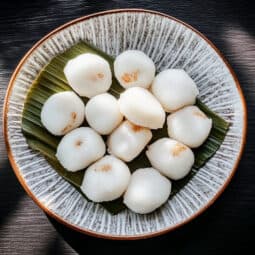
Authentic Puto Calasiao (Traditional Filipino Rice Cake)
Puto Calasiao is a heritage Filipino rice cake that originates from Calasiao, Pangasinan, crafted through a meticulous fermentation of medium-grain and glutinous rice in earthenware vessels. The multi-day fermentation process develops a distinctive texture and subtle sour notes, resulting in snow-white, bite-sized cakes with a perfectly chewy consistency. This labor-intensive delicacy showcases the sophisticated culinary techniques of Filipino rice-based pastries, transforming humble ingredients into a prized regional specialty that continues to drive the local economy of its hometown.
Equipment
- Earthenware bowl (palayok) Traditional fermentation vessel that maintains optimal temperature
- Food processor or blender For achieving smooth batter consistency
- Puto molds (small metal or plastic molds) Creates uniform bite-sized portions
- Steamer (kawa or bamboo steamer) For gentle steam cooking
- Plastic wrap Controls fermentation environment
- Toothpicks Creates ventilation holes
- Silicone brush For greasing molds
Ingredients
For Traditional Method:
- 1 cup medium grain rice bigas na katamtaman
- ¼ cup glutinous rice malagkit
- 1¼ cup filtered water tubig
- ¾ cup + 1 tablespoon sugar asukal
For Quick Method:
- Additional ingredient: ½ teaspoon active dry yeast lebadura
Instructions
- In an earthenware bowl or palayok, combine 1 cup medium grain rice and ¼ cup glutinous rice. Add 1¼ cup filtered water to cover the rice by one inch. Let this mixture soak at room temperature for two full days, keeping the bowl in a dark, quiet spot in your kitchen.
- After soaking, drain the rice but save all the soaking liquid. Put your soaked rice in a food processor. Blend on high speed, adding one tablespoon of sugar and the saved liquid little by little, until it becomes as smooth as pancake batter.
- Pour this smooth mixture back into your earthenware bowl. Cover with plastic wrap and poke small holes in it with a toothpick. Place the bowl in a warm spot in your kitchen and let it ferment for three to four days. You'll know it's ready when the mixture gets thicker and smells slightly sour.
- If you're short on time, you can add ½ teaspoon of yeast at this point and ferment for just 12 hours instead, though the flavor won't be as rich.
- After fermentation, gently stir in ¾ cup sugar, being careful not to overmix. Pour the batter into greased puto molds, filling each about ¾ full. Let them sit for one hour until you see bubbles on top.
- Get your steamer ready with boiling water. Place the filled molds in the steamer and cook over medium-high heat for 15-20 minutes. Check if they're done by inserting a toothpick - it should come out clean.
- Let the puto cool for about 3-5 minutes before gently removing them from the molds. They should be soft and chewy, with a gentle fermented smell. These taste best while warm but stay nice at room temperature for several hours.
- If you're making a big batch, steam them in several rounds, making sure to keep the water at a steady boil. Add hot water to the steamer as needed to keep the steam consistent.
- For the best results, enjoy these little rice cakes fresh from the steamer, when they're still warm and at their most tender. Store any leftovers in an airtight container and steam briefly to reheat.
Tips from Lola's Kitchen
- Use ceramic or earthenware for fermentation - metal can affect taste
- Rice should be fresh, not aged, for best texture
- Place fermentation container in a dark, draft-free spot
- Look for small bubbles and slightly sour aroma to indicate proper fermentation
- Steam in batches to maintain consistent temperature
Nutrition
Calories: 120kcalCarbohydrates: 28gProtein: 2gFat: 0.01gSaturated Fat: 0.003gPolyunsaturated Fat: 0.004gMonounsaturated Fat: 0.004gSodium: 0.2mgPotassium: 2mgFiber: 0.5gSugar: 12gCalcium: 0.3mgIron: 0.04mg
Tried this recipe?Let us know how it was!